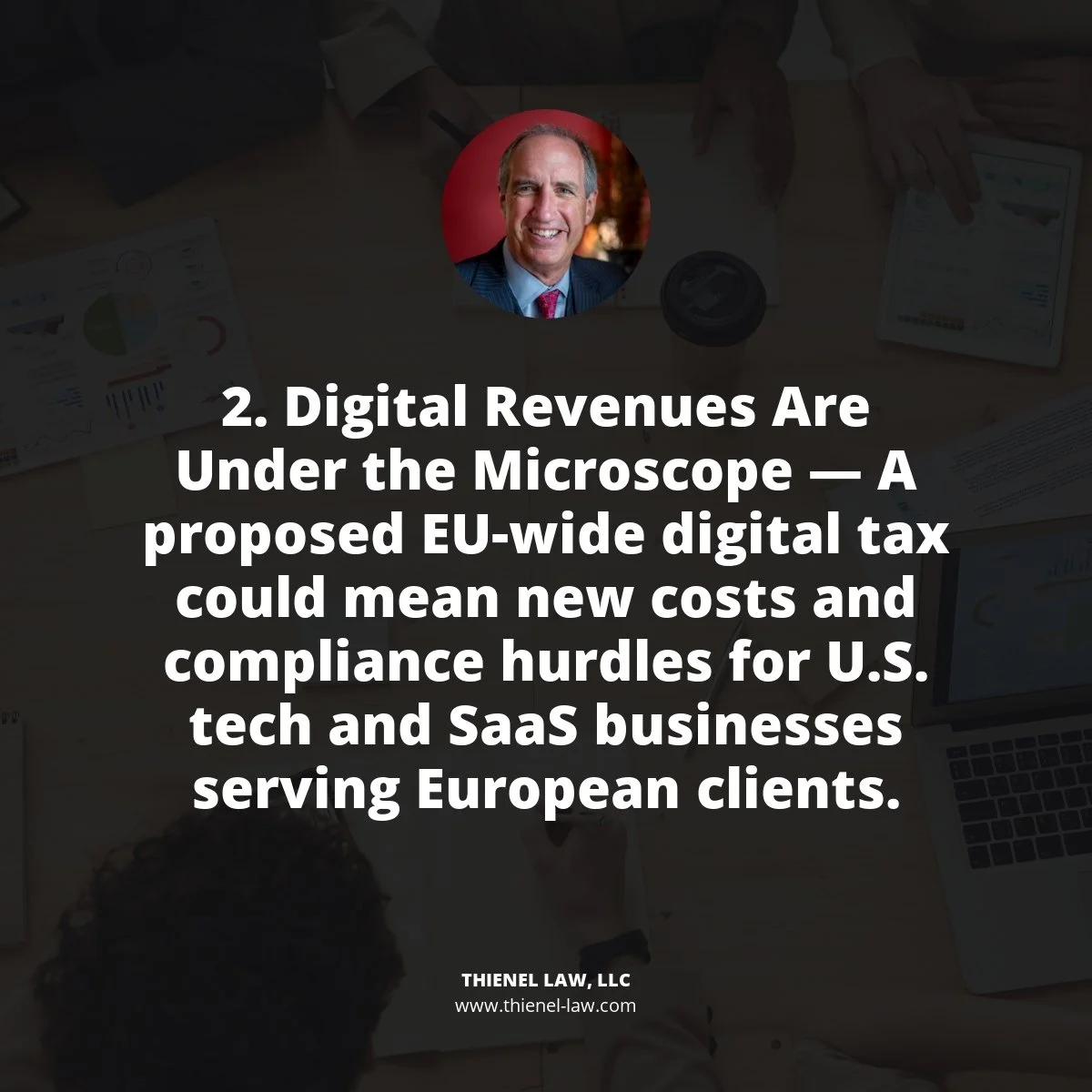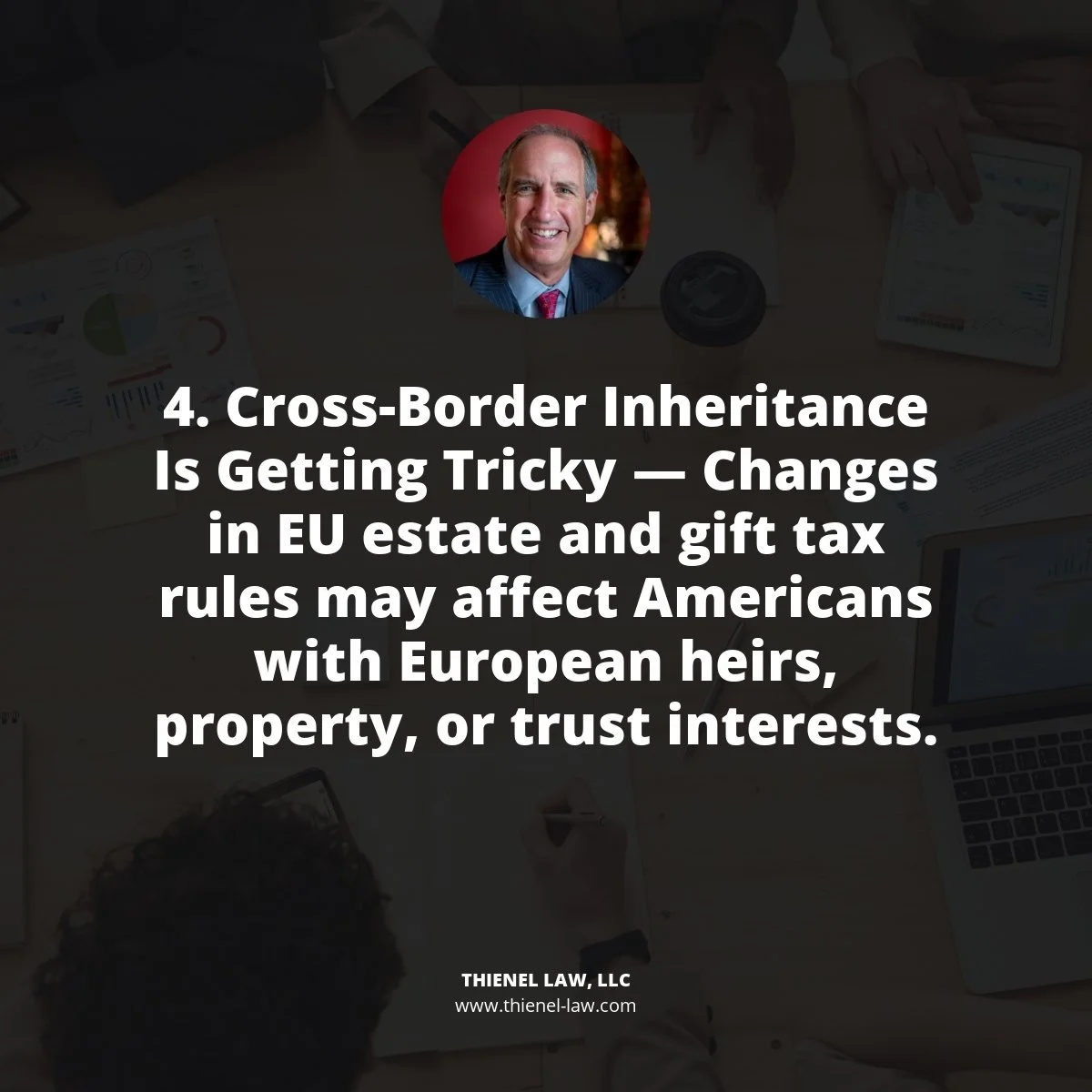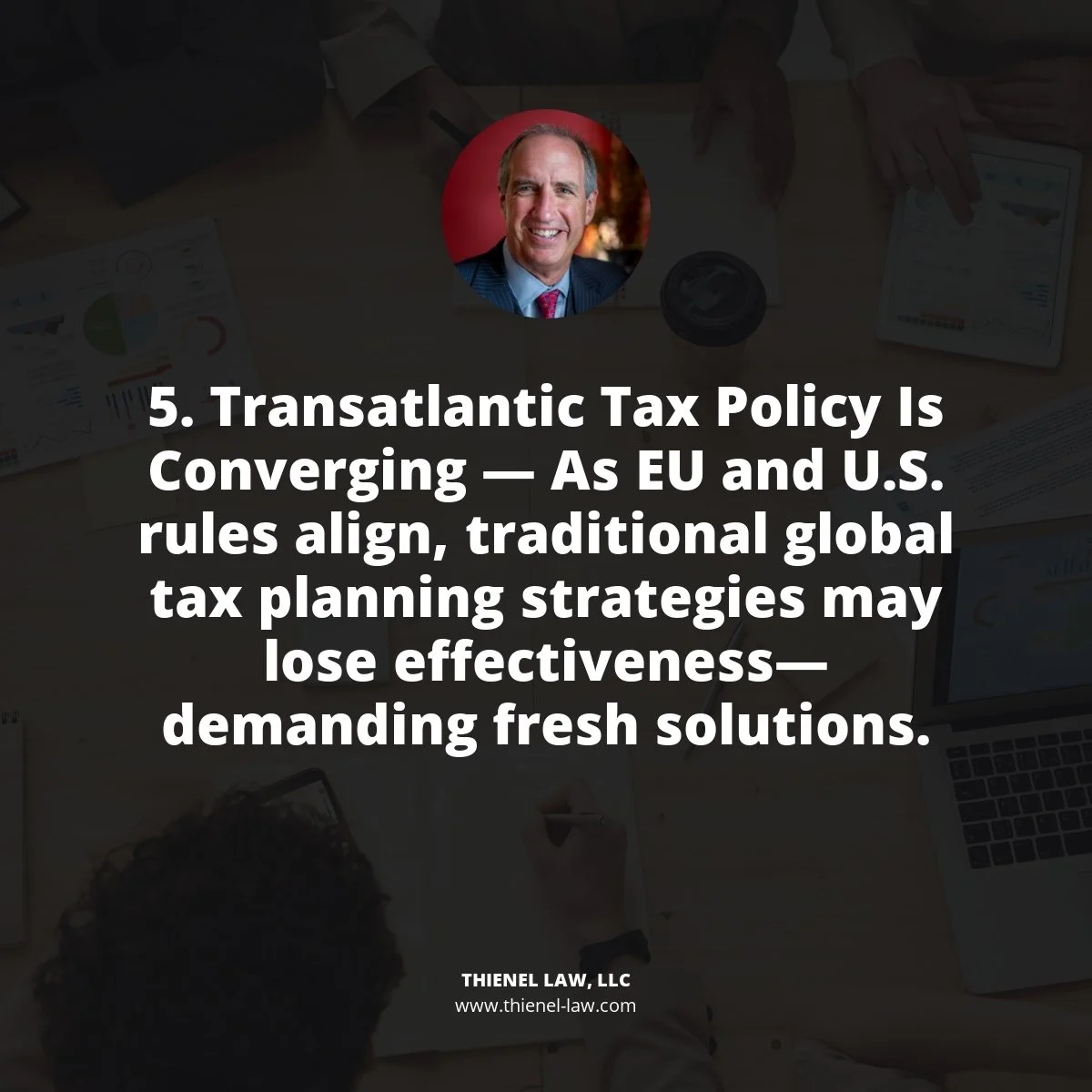Shaping Europe's Fiscal Future: Dr. Michele Chang on the Evolution of the EU Tax Mix
Key Takeaways
The European Union is actively modernizing its tax framework to meet new economic and geopolitical challenges.
Trends in EU tax policy—such as digital taxation, harmonization of corporate tax, and green tax initiatives—could influence future U.S. policy and affect transatlantic businesses.
U.S.-based companies operating in Europe, or partnering with European entities, should watch these shifts closely to manage cross-border risk and compliance.
These changes may prompt adjustments in entity structuring, estate planning, and income allocation for investors and businesses in the DMV region.
Proactive tax planning is essential for professionals and business owners engaging with European markets or dealing with global holdings.
What the Evolving EU Tax Mix Means for U.S. Businesses and Investors
Europe is changing how it collects taxes—and that matters more than you might think.
In a recent interview, Sean Bray of the American Enterprise Institute sat down with Dr. Michele Chang—Director of the Masters in Transatlantic Affairs and Professor of European Political Governance at the College of Europe—to explore the future of the EU tax mix. While the discussion focused on European policy, the implications ripple far beyond the continent. Here in the DMV region, high-net-worth individuals, startups, estate planners, and international businesses all have something at stake.
At Thienel Law, focus on helping clients anticipate and navigate regulatory change. This article distills what U.S.-based clients need to know about Europe’s evolving tax policy—and how these changes might affect your personal or business taxes and finances.
What Is “Tax Mix” and Why Is Europe Rethinking It?
Dr. Chang explains that Europe’s “tax mix”—how government revenue is distributed among income tax, consumption tax (such as VAT), corporate tax, and environmental taxes—is under pressure. The EU is dealing with budget shortfalls, rising public debt, global tax competition, and growing commitments to green transformation.
That adds up to one thing: reform.
In her interview, Dr. Chang outlined several ongoing trends:
Pressure for tax harmonization among member states.
A shift from labor-based taxes to consumption and environmental taxes.
Calls for a unified digital services tax to target global tech firms that operate in the EU but book profits abroad.
-Increased interest in cross-border taxation mechanisms** to support EU-wide initiatives like defense, green energy, and digital infrastructure.
So what does that mean for American investors, entrepreneurs, and cross-border businesses?
Let’s break down the major implications from a DMV perspective.
1. Corporate Tax Harmonization Could Disrupt Existing U.S. Structures
One of the EU’s most ambitious goals is creating a Common Consolidated Corporate Tax Base (CCCTB). This concept would unify how profits are calculated and taxed across EU member states by creating consistent rules for allocating income, deductions, and rates.
Today, many multinational companies—including U.S. tech firms and pharmaceutical companies—benefit from varying national tax rules across Europe. By opening offices in low-tax jurisdictions like Ireland or the Netherlands, they can legally reduce their effective tax rate.
But if the EU harmonizes its corporate tax rules, those options may vanish.
For DMV-area businesses with subsidiaries or operations in the EU—or those considering expansion—this shift raises two key risks:
Reduced tax efficiencies for LLCs or S-Corps currently relying on differentiated EU jurisdictional advantages.
Increased compliance complexity as companies navigate the EU-wide tax scheme that differs from U.S. standards.
However, unanimous support for a CCCTB was not achieved. In September 2023, the CCCTB and CCTB were withdrawn. The European Commission proposed BEFIT (Business in Europe: Framework for Income Taxation) to install a common corporate tax base in the EU.
Tip: Now is a good time to assess how your business would respond to a standardized European tax rate. For example, LLCs exporting products to the EU may need to revise profit repatriation plans or evaluate alternative holding company structures.
2. The EU Is Leading the Way on Digital Taxation—and the U.S. May Follow
Another issue discussed was the EU’s growing frustration with the taxation of digital services.
Large tech companies can offer services and earn billions from European customers without having a substantial physical presence. This has prompted several EU countries—France, Italy, and Spain among them—to enact their own digital services taxes (DSTs), often targeting advertising, data monetization, or platform usage.
The EU wants a unified Digital Services Tax to replace these patchwork national regimes.
The U.S. initially resisted, concerned that these taxes disproportionately affect American firms. However, as international tax reform gains momentum—especially under OECD leadership—the U.S. may eventually adopt similar approaches.
If your business model depends on digital services, proprietary platforms, or monetized user data, you may be in the crosshairs. U.S. companies operating internationally may be forced to account for:
New tax exposures in multiple jurisdictions, potentially without deductions.
Double taxation risk if U.S. and European authorities do not offer relief.
Compliance burdens from tracking digital revenues by user location.
Example: A U.S.-based SaaS company serving customers in multiple EU countries could soon face local taxation on gross revenue in each market. Passive ownership interests or equity stakes in these entities (such as through a trust or estate) may also need reevaluation for tax exposure and planning purposes.
3. The Rise of Green Taxes Has Global Implications
Dr. Chang also noted Europe’s growing reliance on “green taxes.” These are levies tied to climate goals, such as taxes on carbon emissions, waste generation, fossil fuels, or non-recyclable packaging.
Most notably, the EU is planning to implement a Carbon Border Adjustment Mechanism (CBAM)—a tariff-like instrument applied to imports based on their carbon footprint.
If adopted, CBAM could indirectly tax U.S. goods entering the EU—raising prices, changing procurement strategies, and encouraging domestic climate regulation.
Businesses in DMV sectors such as defense, clean tech, energy, and manufacturing must monitor developments here. Even estate planning advisors should take note—especially when advising clients with ventures or holdings abroad.
For example:
A Maryland-based LLC exporting building materials to Germany may be hit with CBAM fees based on the carbon intensity of its products—even if U.S. law does not require carbon disclosures.
A Virginia investor holding shares in an EU manufacturing firm may find shifting profitability due to environmental taxes that lower dividends or stall growth.
Green taxation is no longer just about policy—it’s about risk management and bottom-line strategy.
4. Cross-Border Estate Planning Requires More Precision
As EU tax regimes evolve toward greater centralization, estate planning strategies involving European beneficiaries, clients, or investments must adapt.
Clients in the DMV region with dual citizenship, family abroad, or property in the EU could become subject to increased tax obligations. These include:
Cross-border inheritance taxes
Gift taxes between family members across national borders
Wealth reporting for foreign-held assets
A trust or bypass trust designed to shield certain U.S. assets might not be recognized as valid under European rules—or worse, may incur tax as a “foreign entity” under anti-avoidance laws.
With European countries exchanging more cross-border tax information under expanded treaties, the room for error (or optimization) is shrinking.
Example: A D.C. entrepreneur holding equity in a Belgian start-up might discover that gifting those shares to a child studying in Paris triggers a local gift tax—even if done through a U.S.-based trust.
5. Transatlantic Policy Convergence Is Increasing
Perhaps most importantly, Dr. Chang points to a long-term trend: greater convergence between the EU and U.S. on how they tax income, capital, and digital commerce.
For business owners and high-net-worth individuals in the DMV region, this means that familiar strategies—from choosing Delaware for incorporation to using pass-through entities for international returns—may lose effectiveness in the new global tax environment.
If Europe introduces a standardized corporate income base, and the OECD coordinates minimum global tax rates, American entities operating abroad will need to adapt—fast.
Government scrutiny is increasing. Recordkeeping, compliance, and strategic planning must rise to meet it.
What Does This Mean for Business Owners and Professionals in the DMV?
Whether you’re running a small but globally active consultancy in Fairfax, a tech startup in Rockville, or managing international assets from D.C., the implications of Europe’s tax reform are real.
You may need to:
Reassess multinational structures or holding companies.
Modify your estate or gifting strategies involving EU property or heirs.
Anticipate new costs associated with digital revenue, transactions, and imports.
Increase compliance and reporting investments to protect against transatlantic regulation.
With the EU setting a new course on global taxation—and the U.S. responding in kind—the time to update your strategy is now.
Need Help Navigating the Changing Tax Landscape?
If you’re unsure how these global tax changes apply to your business or personal situation, we’re here to help.
At Thienel Law, we advise business owners, professionals, and families in Maryland, Virginia, and Washington, D.C. on local and international tax matters. Whether you operate across borders or hold assets worldwide, we can help you stay compliant—and competitive.
Schedule a consultation with Steve Thienel to get advice tailored to your goals. Now’s the time to position your business for what’s ahead.






